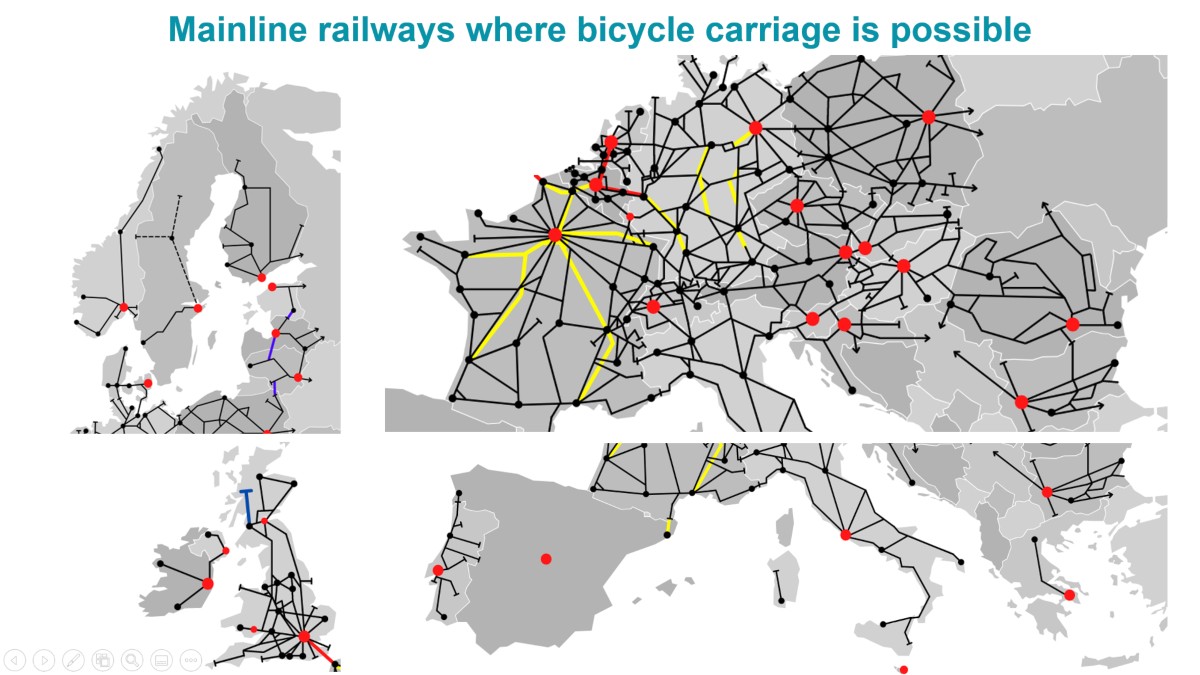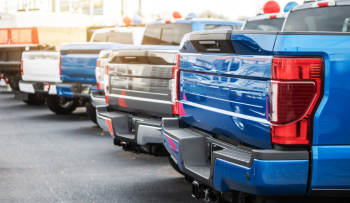
“Bikes and trains is a winning combination”: new report ranks Europe’s train companies
ECF’s latest publication, “Cyclists love trains,” sets a benchmark for intermodal travel on Europe’s railways. The report ranks the bicycle friendliness of 69 European rail operators and was launched at a high-level online event organised by ECF.
How bike friendly are Europe’s rail companies? As part of the European Year of Rail, the European Cyclists’ Federation (ECF) has published an ambitious report analysing and ranking 69 railway companies and services across the continent according to their bicycle friendliness.
Over 600 participants registered for the report’s launch event on 7 July 2021 to experience a number of high-level speakers discussing the report and the future of bike-and-train intermodality in Europe. Notable figures in attendance included Georges Gilkinet, Belgian Deputy Prime Minister and Minister of Mobility, Anna Deparnay-Grunenberg, Member of the European Parliament, and Isabella Grahsl, Head of Business Performance and Development at Deutsche Bahn Connect,
“I’m delighted to see this kind of meeting, which puts cycling and rail back at the heart of mobility policies in Belgium and throughout Europe. It’s very important to share experiences, it’s a good way to improve ourselves,” said Gilkinet at the event. He praised bike-and-train travel as a winning combination that is both sustainable and effective and welcomed the report as “a strong message from the European Cyclists’ Federation and all its member associations.”
What does the report tell us?
The publication of “Cyclists love trains: An analysis of the bicycle friendliness of European railway operators” has shone a spotlight on the best practices that help facilitate intermodal travel, while also reflecting on the widespread shortcomings of most railway undertakings.
“We know that cyclists all over Europe increasingly want to be able to take their bicycles with them on trains,” said ECF CEO Jill Warren. “This extensive piece of research can be used by policymakers and industry leaders alike to benchmark their performance, study examples of shortcomings and best practices, and understand where the potential for improvement is.”
The report has evaluated and scored European railway undertakings on six different indicators, including the number of bicycle spaces on trains, the cost of bike space reservations and the functionality of booking and reservation channels.
The overall conclusion of the report is that there is still much work to be done to achieve seamless intermodal travel between bicycles and trains in Europe. Of the 69 railway undertakings analysed, only one (NS-DB Intercity Berlin) is ranked as “excellent.” This result pales in comparison to the 15 undertakings which do not currently accept non-foldable and un-dismantled bicycles, thus being ranked as “very poor” in terms of bike friendliness.
The report also highlights a need for more unified interventional policy at the EU level to ensure better accommodation of bicycles on trains throughout EU member states.
Map detailing railway undertakings across Europe
“The current situation is quite a disjointed European rail ecosystem,” concluded Charles Carnegie, ECF Policy Intern and author of the report, at the event. “The disjointed nature of European rail infrastructure is emblematic of the complex and often confusing rules and regulations regarding bicycle carriage. Making it easier for the passenger must be a priority. Build it and they will come.”
Within the report, ECF has also provided recommendations for how railway companies can improve their services to better accommodate bicycles. The core premise underlying these recommendations is flexibility for the user, particularly regarding the following key issues:
- Acceptance of non-foldable and un-dismantled bicycles on all train services.
- Dedicated bicycle spaces which are accessible and easy to use for all types of passengers.
- Investment and promotion of bicycle sharing schemes.
- The provision of clear and concise information on bicycle services.
- A pan-European journey planner and coordination of bicycle carriage rules.
“Now it’s time for implementation”
The launch event gathered representatives from rail operators ranked in the report as well as from EU institutions and the French government.
“We are convinced that a strong railway system is very much important for the climate but also for people,” said Isabella Grahsl of Deutsche Bahn Connect, who welcomed the report’s insights. “It's a great source of inspiration for all railway companies regardless of where they rank.”
Speaking on behalf of SNCB-NMBS, Intermodality Manager Denis Brachet mentioned that bicycle use is on the rise in Belgium, and deemed it a challenge “to meet the demand of cycling to the station and the facilities needed to park bicycles at the station.” Nevertheless, he insisted that it is something that is important to support.
It seems likely that the upward trend of bicycle users will continue, both for commuters and for holiday travellers. “The last figures on bike tourism are really exploding in France, so I’m sure lots of things will happen in the coming years,” commented Thierry du Crest, Interministerial Coordinator for the development of bicycle use at the French Ministry of the Ecological Transition. “Now, after having published laws and decrees in France, it’s time for implementation.”
“Bikes and trains are a really perfect match for sustainable tourism, for greener mobility of the future,” said Anna Deparnay-Grunenberg, who is also the European Parliament’s rapporteur for the European Year of Rail.

Event moderator Laura Laker and MEP Anna Deparnay-Grunenberg
The future of bikes on trains
Despite the disappointing results for many European train companies in terms of encouraging sustainable intermodal transport, the “Cyclists love trains” report also shows some promising signs for improvement. Countries and railway operators with designated strategies for integrating cycling and rail journeys have scored quite well, such as Belgium’s SNCB/NMBS, which ranks joint second with Switzerland’s SBB. This shows that planned investment in intermodal transport facilities does indeed pay dividends.
“Today we are celebrating progress. It’s important, it’s one more step,” said Georges Gilkinet. “But we will not lose sight of the work the remains to be done. This is just the beginning, we have to work for better information, better material and cheaper rates for cyclists.”
The relationship between cyclists and trains certainly has the potential to grow and improve in the coming years. “Like any good relationship there is love and there are challenges and we must find a balance in meeting the needs of all of our customers – cyclists included,” said Lisbeth Blum, Senior Manager of Product Innovation at DB Regio AG.
“Cyclists are deeply in love with trains, but most train companies don’t realise that they are being loved,” said ECF President Henk Swarttouw in his closing remarks at the launch event. “This is so surprising because, with a view to our climate goals, emissions goals and sustainability of our transport, we are such natural allies.”
Download the report here.
Regions:
Contact the author
Recent news!
Upcoming events
Contact Us
Avenue des Arts, 7-8
Postal address: Rue de la Charité, 22
1210 Brussels, Belgium










